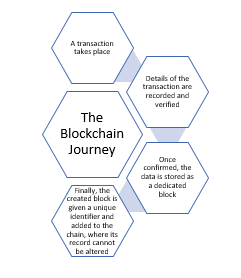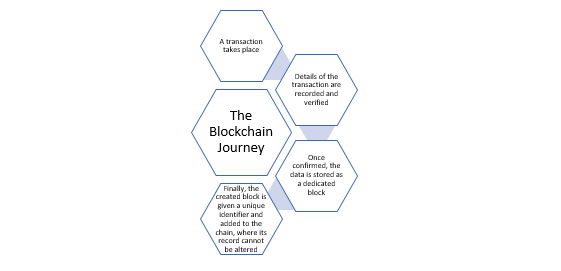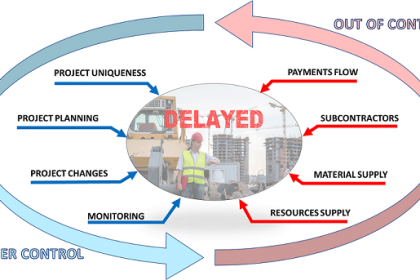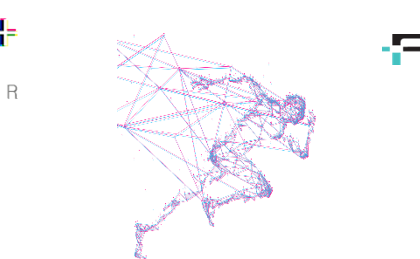Blockchain technology has evolved greatly since the introduction of Bitcoin in 2008 by Nakamoto, the first decentralized peer-to-peer electronic cash system. Since then, Blockchain technology kept raising confidence across industries. Retail, logistics, automotive, healthcare, public sector and the financial sector in particular have already gained successful experience. Technologies such as blockchain, not only brings major opportunities and optimization for potential companies. In particular, it has a huge impact on payment transactions and the financial markets.
Stated by world economic forum, 7 Jan 2021, the total cryptocurrency market hit an all-time high exceeding $1 trillion for the first time. Renewed interest in, and conversations around, blockchain technology and digital currencies from industry and government leaders have accompanied the rise.
With the help of a decentralized database shared by many participants, a blockchain allows information to be exchanged in a forgery-proof manner, preventing copies. The distributed ledger technology (DLT) is a way of recording and sharing data across multiple data stores (also known as ledgers). Data is stored, shared and synchronized across multiple sites, institutions, or geographies, accessible by multiple people in a peer-to-peer network. These records are collectively maintained and controlled by a distributed network of computer servers, which are called nodes.
How does that work in practice? Someone initiates a process by generating a data set (block) which is then verified and stored by thousands or even millions of computers on the network. The verified block is cryptographically encrypted and attached to a chain of data records (blockchain), so that a large number of unique data records are created, each with its own, traceable history.
As a result, blockchains are secure, always-up-to-date directories in which digital transactions can be securely tracked, in a way that is understandable for the participants. They are constantly being extended chronologically and linearly, similar to a chain in which all participating computers are connected and are constantly being expanded with new links.
What makes the blockchain so special? The blockchain is a technology that enables secure, non-manipulable transactions in the network and is therefore also interesting independently of Bitcoin. An example from Blockgeeks.com makes it clear how much it can change markets: When we buy a train ticket on the web or via an app today, a credit card company is usually involved, and transaction fee is involved. A blockchain-based system could handle the ticketing process securely and directly without any transaction costs between the rail company and the passenger. Railways and customers would be happy and intermediaries would be left behind.
Blockchain brings cost-efficiency, fast settlement, security and transparency into the payment game because of its decentralized, secure and immutable nature. According to the public survey of the European Central Bank (ECB) on the digital euro, a fundamental change in the course is expected in the summer of 2021. The payment service provider Visa wants to put an interface into operation this year, via which financial service providers can integrate crypto offers into their portfolio. The development is clear: cryptocurrencies are becoming more important. They are based on cryptographic methods, such as asymmetric encryption, and are traded in a blockchain network via peer-to-peer connections (P2P).
Another survey from Deloitte shows that last year, an increasing number of leaders have expressed this sentiment, saying that they see blockchain as a top-five strategic priority, and are increasing their investments in staffing and blockchain technologies. And their latest survey data suggests that organizations clearly view blockchain as a top priority, edging up to 55% of respondents (versus 53% in 2019 and 43% in 2018).
The advantage of cryptocurrencies over traditional monetary systems is the low access requirements. In principle, anyone can become part of the blockchain network. All you need is a computer or smartphone and a freely available app and you are independent of international payment systems. Blockchain technology has all the attractive characteristics needed by a reliable technology involving money matters. It is safe, secure, decentralized, transparent as well as relatively cheaper. Technologies derived from blockchain – distributed ledger technology (DLT) – also represents a huge opportunity for international payments, especially outside the SEPA zone, faster processing, easier reconciliation, and greater transparency on fees to meet customers’ demands.
At this stage, we are not very sure when it would be possible to make payments on marketplaces via Cryptocurrencies powered by Blockchain but we can see big steps when Elon Musk of Tesla invests heavily in Bitcoin with the interest to receive payments in Cryptocurrency.
It hints that time is not far when Rentaga customers will order their machine rentals using cryptocurrencies and it would be a great day when our customers will be ready to order a Scissor Lift, an Excavator, a Telehandler, or a Boom lift by paying through Blockchain solution.




